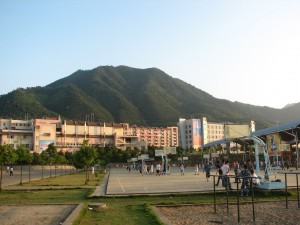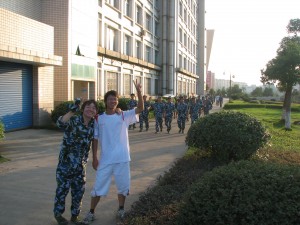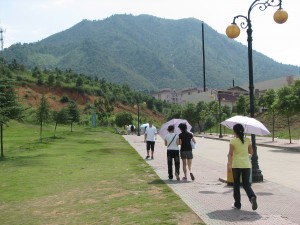Teaching Thoreau in the Heartland of China
 I was teaching Thoreau in a time when the Chinese were migrating from the countryside into the cities. It was a new Industrial Age—but this one was taking place during the age of globalism, cell phones, and Hello Kitty. Experts estimated that a population greater than that of America’s total population would move into Chinese cities within the next 15-20 years.  There I was at the vanguard of this exodus where some of my students had left their families behind in the rice paddies. These students were their family’s only hope.
I was teaching Thoreau in a time when the Chinese were migrating from the countryside into the cities. It was a new Industrial Age—but this one was taking place during the age of globalism, cell phones, and Hello Kitty. Experts estimated that a population greater than that of America’s total population would move into Chinese cities within the next 15-20 years.  There I was at the vanguard of this exodus where some of my students had left their families behind in the rice paddies. These students were their family’s only hope.
But for those now living and working in the cities, there was the heady pleasure of shopping. The cities became a Promised Land, and consumerism quietly ousted atheism as the dominant faith. In the Promised Land you could work in a factory and escape the ceaseless toil of the rice paddies. Of course, it was your job in the factory to crank out more stuff for other people to buy. And of course, you had to tear down the last vestiges of traditional China, and bulldoze Mother Nature in the name of progress. Anything to modernize China. Anything to become a member of the middle class. Yet for some Chinese these issues of modernity were recognized as a problem—and without Thoreau having to tell them.
In the English translation of the China Daily one commentator wrote that China will experience the same problems as the West:
…as China continues to develop, and as more and more people bring themselves out of poverty and a middle class society slowly develops in China, then the PEOPLE of China are gradually going to want to have more say in their lives also, they’re going to want to argue and debate everything as well, it’s simply a natural state of living in a developed country, pure and simple. Nothing to do with being American or being Chinese, it’s simply a NATURAL HUMAN STATE AS A RESULT OF LIVING IN A DEVELOPED SOCIETY.
 If true, then perhaps China needed Thoreau. For my students, Thoreau’s essay was the first mountain of our journey. For China, Thoreau offered insights into nature, the meaning of life in an age of unbridled consumerism, and an education in self-reliance. Perhaps someday some of students will return to Thoreau and make more sense of his writings. But for now, “Reading†served as the threshold that our fellowship had to pass through in order undertake the more serious journey of studying literature.
If true, then perhaps China needed Thoreau. For my students, Thoreau’s essay was the first mountain of our journey. For China, Thoreau offered insights into nature, the meaning of life in an age of unbridled consumerism, and an education in self-reliance. Perhaps someday some of students will return to Thoreau and make more sense of his writings. But for now, “Reading†served as the threshold that our fellowship had to pass through in order undertake the more serious journey of studying literature.
I taught Thoreau to my junior literature students. As expected this first assignment was very difficult for them. I told them to just plow through it as best they could and not get bogged down by the vocabulary and endless references to Roman and Greek classics. It would suffice if they could just get the basic idea of it.
I helped the student contextualize Thoreau with a powerpoint slide show on his life and times. First, I described some of the contemporary historical events: the reign of Queen Victoria, Karl Marx’s The Communist Manifesto, the Taiping Rebellion in China, and then another slide about what was going on in America. I was teaching Thoreau in a time of war, and Thoreau had written his work between two major American wars: the Mexican-American War and the Civil War.
Students knew that the Civil War took place between 1861 and 1865, and that it was a war to end slavery. Then I developed their knowledge further by explaining the controversy of states rights, and some the economic causes of the war. Their face lit up when I tied it all in to their favorite Western epic, Gone With the Wind. This book was universally acknowledged in pop culture and academia throughout Asia as the greatest Western novel ever written and rivaled the works of Homer, Dante, Shakespeare, et al.
 Class concluded with one of Thoreau famous quotes “Advance confidently in the direction of your dreams.†Later that day a student emailed me about her dreams. It had to do with the movie, American Pie. If you haven’t seen this movie, click on the links to get a better idea of what the movie is about before reading further. Wikipedia.org described American Pie as a “1999 teen sex comedy film†in which four high school boys swear an oath to lose their virginity before graduation—need I say more? So imagine my consternation when one student emailed me about advancing confidently in the direction of her dreams:
Class concluded with one of Thoreau famous quotes “Advance confidently in the direction of your dreams.†Later that day a student emailed me about her dreams. It had to do with the movie, American Pie. If you haven’t seen this movie, click on the links to get a better idea of what the movie is about before reading further. Wikipedia.org described American Pie as a “1999 teen sex comedy film†in which four high school boys swear an oath to lose their virginity before graduation—need I say more? So imagine my consternation when one student emailed me about advancing confidently in the direction of her dreams:
My biggest ambition after graduating is to go to America. I am interestd in your lifestyle and your colourful life in University and your way to work and communicate with each other. There is an American moive called American pie. I am not sure if you have seen it. It’s a interesting moive about Ameican students lifes in school. I am very looking forward to that kind of life…
I saw American Pie almost a decade ago. We now know that film scholars and philogists everywhere agreed that this is The Movie that promulgated the word “MILF†into the American lexicon. But for me the movie wasn’t so funny. (But that was when I was 23 going on 53 but now I am 33 going on 23–perhaps now I’m ready for it.) I yawned through most of it, and checked my watch several times throughout the film. I only remembered half its dialog because it’s repeated over and over as a cultural reference point. But had I known so long ago that this movie would serve as the bridge over the vast chasm between different cultures I would have paid more attention to this film.
I waited for another student’s email saying she was so inspired by my class on Thoreau that she decided to read his buddy, Emerson, particularly his essay “The American Scholar.†But alas, no such email found its way into my inbox. Maybe it’s still out there somewhere floating around in cyberspace.
One Comment
Pingback: